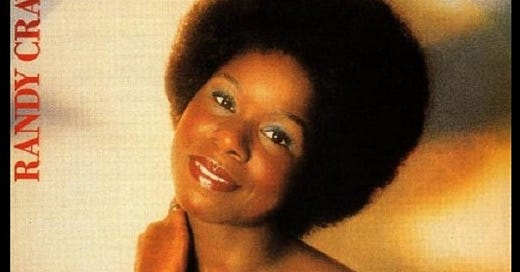Randy Crawford (born February 18, 1952) – I Let You Walk Away (1976)
This beautiful love song from the great singer's debut LP featured an all-star backing band with Joe Sample, Hugh Masekela, Eric Gale, and James Gadson.
View most updated version of this post on Substack
Search our full archives
Randy Crawford is a jazz and R&B singer who released sixteen solo albums over her thirty year career, several of which went top-ten in the UK. She memorably sang lead vocals on the Crusaders’ 1979 hit “Street Life.”
Veronica “Randy” Crawford was born in Macon, Georgia and raised in Cincinnati, Ohio. She got her start singing in church, and one of her first live performances on lead vocals was with a band featuring Bootsy Collins on bass. In 1972, she toured as the opening act for George Benson. She briefly signed to Columbia and released her first single in 1973, the funky “Don't Get Caught (In Love's Triangle),” which was written and produced by Johnny Bristol and arranged by Gene Page.
Her debut album Everything Must Change (1976) on Warner Bros. was produced by Stewart Levine, who formed the independent label Chisa Records with Hugh Masekela in the late sixties and produced over a dozen records for the Crusaders. The LP was backed by The World Jazz Association All Star Band, an incredible mid-seventies lineup of jazz-funk legends. Its 30+ members included Masekela on flugelhorn, Crusaders keyboardist Joe Sample, Eric Gale and Larry Carlton on guitars, MFSB bassist Anthony Jackson (who was credited with co-writing “For The Love of Money” with Kenny Gamble and Leon Huff), Ralph MacDonald on percussion, Seldon Powell on sax, and the great James Gadson on drums.
The album’s superb title track opening cut was one of two songs recorded live at the All Star Band’s debut concert in Los Angeles during November, 1975. It was written by Benard Ighner, who sang his original version on Quincy Jones’ 1974 LP Body Heat, which also included several songs by Leon Ware.
She covered an exquisite version of “I’ve Never Been To Me,” co-written by Motown songwriter Ron Miller and originally released the same year by Charlene, whose original barely charted. When it was re-released in 1982 by Motown, the song went to #3 on the Billboard Hot 100, becoming the label’s first top-ten hit by a white female artist. However, Crawford arguably sang it better.
Everything Must Change also featured the beautiful slow jam “Only Your Love Song Lasts,” co-written by Art Munson and Stephen Kalinich. The beautiful closing cut “Gonna Give Lovin' a Try,” co-written by Julian “Cannonball” and Nat Adderley, was the other song on the album recorded live. Another highlight was the gorgeous love song “I Let You Walk Away,” written by Neil Sedaka with lyrics by Phil Cody.
Her second album Miss Randy Crawford was released in 1977 and produced by Bob Montgomery. Its stellar opening cut was the upbeat jam “Hallelujah, Glory Hallelujah,” written by Juanita Rogers.
Two of its songs were penned by unsung singer/songwriter Paul Kelly, one of which was the superb cut “Take It Away from Her (Put It on Me).” The very funky “Half Steppin’” was written by Curtis Wilkins, who would shortly help Wilson Pickett stage a minor disco comeback with the #59 R&B “Who Turned You On” from his 1978 LP A Funky Situation.
In 1979, Crawford was asked by Joe Sample to sing lead vocals on the title track to the Crusaders’ album Street Life. Released as a single, it hit #17 R&B and #36 on the Hot 100, but went to #5 on the UK singles chart. The song effectively jump-started Crawford’s career in the UK, although hits would continue to elude her in the United States.
The following year, Crawford had a #2 UK hit with the beautiful song “One Day I’ll Fly Away,” from her fourth studio album Now We May Begin (1980). It was co-written by Joe Sample and lyricist Will Jennings, and co-produced by Sample and his fellow Crusaders Wilton Felder and Stix Hooper.
Sadly, Crawford suffered a stroke in 2018, shortly before what were scheduled to be the final South Africa performances of her farewell tour.
Happy Birthday to the great Randy Crawford.
Further info:
“Pliant Voice Aids Randy Crawford,” The New York Times, January 28, 1972.
“Randy Crawford's journey from Street Life to sweet life,” interview by Helen Brown, The Telegraph, October 27, 2008.
“In the season of love, no song touches the heartstrings quite like Randy Crawford's 'Almaz',” by Justice B. Hill, Cleveland.com, February 17, 2023.
#soul #jazz #funk #RandyCrawford







Your substack is becoming one of my new favorites. Thank you for highlighting many important artists and songs that would otherwise be lost or buried. Each of your articles a spectacular read!